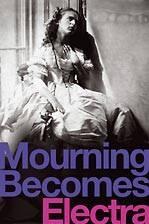Mourning Becomes Electra
Howard Davies' mammoth four and a half hour production of "Mourning becomes Electra" breathes dramatic life into Eugene O'Neil's melodramatic retelling of the matricidal Electra, from the Greek tragedy 'The Oresteia'. O'Neil's use of affected speech, his embellishing of the sensational and inability to allow pathos to find silent expression can cause his work to drown in a sea of histrionics. However, in Davies' capable hands "Mourning Becomes Electra" is inflamed with passion, a passion that ferments the play's dark obsessive emotions into an intoxicating brew.
Brigadier General Ezra Mannon (Tim Pigott-Smith), a victorious war-hero, returns home after the American civil war to his adulterous wife Christine (Helen Mirren) and adoring daughter Lavinia (Eve Best). When Ezra is poisoned by his wife, Lavinia decides to take revenge against her mother by plotting with her brother Orin (Paul Hilton) to murder their mother's lover Adam (Paul McGann). However, since this is O'Neill the story itself is merely a device to explore the psychology of sexual relations, and as a great admirer of Freud, these sexual relations are based on disturbing sexual complexes. O'Neill, may not have believed in the Greek goddesses of fate, the Moirae, those horrid old hags who weave the threads of destiny that control our life, but he did believe in those more compelling urges that Freud and the new 'science' of psychology had recently unearthed.
Here both the Electra and Oedipus complex are written in large bold colours. Lavinia adores her father and is jealous of her mother. The fact that her mother has taken a younger lover, one whom Lavinia adores, merely adds to her hatred. Orin's love for his mother verges on the incestuous and he cannot bear the thought of having to share her with any other man, even in his sleep he dreams of murdering men who look like his father. This heady mixture of psychosis leaves a trail of death and despair that ends with ghostly echoes of incriminations.
Helen Mirren is superb as the cold calculating matriarch Christine. When dealing with all but her lover, Mirren's face encapsulates the mendaciousness that lies behind each of her characters gestures. Paul Hilton delves into the madness of his character Orin and you can almost touch the all-consuming self-contempt that finally destroys him, so palpable is his portrayal. However, his performance at times verges on the histrionic and in the final act I felt sorry for his fiancé Hazel (Rebecca Johnson), who asks him as he sits eyes glazed, stricken with guilt, "I can tell there is something wrong with you?" a question greeted with laughter by some members of the audience!
However, there is no doubt that the star of the show is Eve Best, who gives what must surely prove to be an award winning performance as 'Lavinia'. Caught between a sexual passion that she initially fears, and an inflexible wish for revenge she finally manipulates her brother, plunging him into insanity in order to get revenge on her mother. Freed from her mother's grip we watch as she slowly blossoms into womanhood, only to find her new freedom haunted by the ghosts of her family. She is able to squeeze every emotion out of her character and in the final scene when she imprisons herself in the family mansion, the hopelessness which she expresses with every fibre of her being makes her look as if she has already left this life to communicate with the ghosts that haunt her.
Bob Crowley's set design captures the sense of decay: a family mansion whose veranda has a flaking ceiling on which is painted a faded Union Flag. Inside the house the rooms merge into each other, with dark corridors and impressionist style portraits, this undefined space expresses the subconscious desires that underlie O'Neill's tragedy.
(photo by Lady Haywarden, V&A Picture Library)
What other critics had to say.....
NICHOLAS DE JONGH for THE EVENENING STANDARD says, "Gripping epic tale." MICHAEL BILLINGTON for THE GUARDIAN says, "Eve Best's Lavinia is astonishing." BENEDICT NIGHTINGALE for THE TIMES says, "I was swept away by the clarity and punch of Howard Davies's production." PAUL TAYLOR for THE INDEPENDENT says, "A touch of greatness." ALASTAIR MACAULAY for THE FINANCIAL TIMES says, "It's a National triumph."
External links to full reviews from popular press
The Guardian
The Times
The Independent
Financial Times
Originally published on
